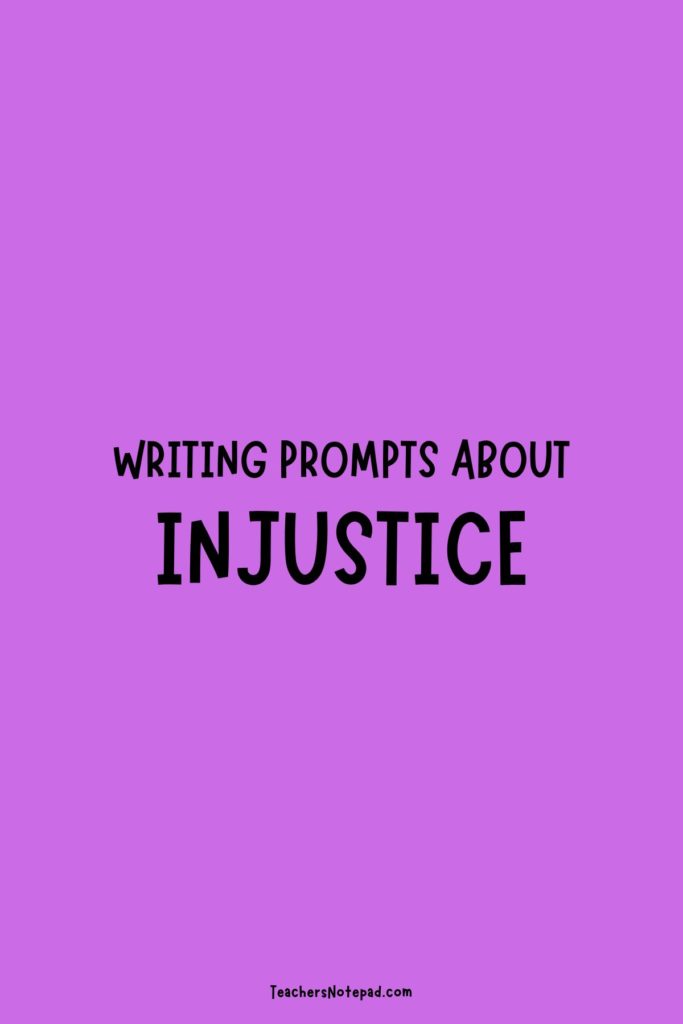As students get older, they learn more and more about the world around them.
This means that they learn about all of the great and wonderful things, but also about all of the ugly and negative things that exist as well.
Writing about injustice, racism, and social justice can feel like a controversial topic—and it was until fairly recently.
However, students have access to the news and social media via their smartphones all day. They have opinions and feelings about what is happening in their school, in their community, and in the country around them.
Below, you’ll find a list of writing prompts about injustice and racism that can help your students reflect on current events, social justice movements, and the very real issues that they might not realize some of their closest friends or classmates might be facing.
How to use these Prompts:
These writing prompts can be used as a guide to help students reflect on the things that are happening every day in the United States.
Sometimes, simply using a writing prompt can help them untangle the mess of thoughts they have about these tumultuous events.
These can also be used in tandem with social studies or history lessons.
Here are some ways you can use this list in your classroom:
- If an act of racism or injustice happens in your school and students need to talk about it, direct them to these prompts to help get their thoughts out onto paper.
- Encourage students who are not victims of racism and injustice to use these prompts to better understand their peers who are.
- Challenge students to choose one writing prompt every day for a week, and at the end of the week have them reflect on what they’ve learned.
The Writing Prompts:
- What does treating people equally and fairly look like to you?
- What causes injustice? What are some of the consequences of injustice in society?
- How can you act against injustice within your school?
- How can you act against injustice within your community?
- What happens when we speak out against injustice in an online setting?
- How does a person’s response to injustice reveal their shortcomings?
- Compare and contrast speaking out online and speaking out in a protest or another public setting.
- Why is staying silent about injustice sometimes as harmful as the injustice itself? Provide examples.
- Write a poem using the following words: freedom, power, justice, voice, speak
- Explain the saying, “It only takes one person to make a change”. Provide two examples.
- Do you feel that violence is ever justified?
- Write about the first time you ever challenged racism.
- If you’ve never challenged racism, write about how you think students of your age are capable of doing so.
- Have you ever been treated differently or unfairly because of your race? Use examples.
- Are you comfortable talking about racism and inequality with others? Why or why not?
- Compare and contrast social justice and equity.
- What role does discrimination play in humanity as a whole? Provide examples.
- Compare and contrast racial bias and injustice.
- Write a short story about someone facing injustice in their community.
- How does diversity affect social justice?
- What does it mean to be an activist? Name some examples of types of activists you’ve heard of.
- What does it mean to be anti-racist? Explain with examples.
- Research a poem about injustice. Copy your favorite lines, and write what they mean to you.
- Why is it so important to take action or speak up when you see something that you think is wrong?
- What is the history of the Black Lives Matter movement?
- How does racism affect what students are taught in school?
- When did you first become aware of your racial identity? Explain the scenario.
- Write a poem using the following words: raise, fight, equal, strong, together
- How can you use your hobbies and interests to promote diversity?
- Write a letter to someone you know, and explain how injustice has affected your life.
- Why does it feel so hard to stand up for someone who needs it?
- How can you stand up for someone the next time you see them being treated unfairly?
- Write a short story that takes place during a protest.
- Describe a time when you did or said something that was racist. What should you have done or said differently?
- Why is it never funny to make racist jokes?
- How has the Black Lives Matter movement brought more awareness to police brutality?
- What is racial profiling? Use examples.
- Why was racial segregation so widely accepted in the U.S.?
- What are some of the things that make you feel safe in your community?
Needing Thought Provoking Writing Prompts?
From racism and injustice to holidays and history, our site is home to an abundance of resources that can be used inside and outside of the classroom.
Check out our writing guides, substitute teacher forms, and so much more—and let us know if there’s anything you think we should write about next.


